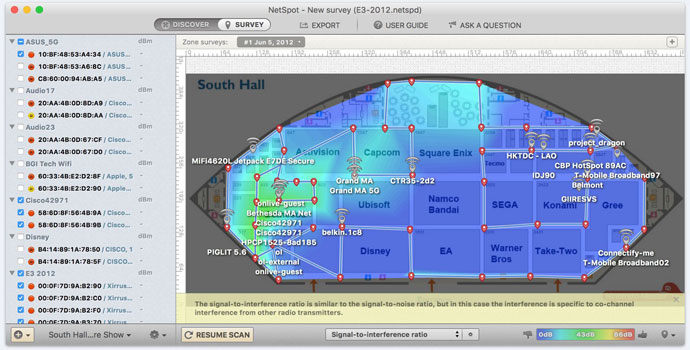

That's one of the fastest numbers we've ever seen from a mesh router in that test, and it only fell to 666Mbps at a distance of 75 feet - which is still faster than we saw from the Nest Wifi up close, just 5 feet away.
#Netspot review pcmag full#
With full support for Wi-Fi 6 and a second 5GHz band that serves as a dedicated backhaul connection for the router and its satellites, the powerful system was downright impressive in our tests, with top speeds of nearly 900Mbps at close range in our lab. It typically sells for close to $450 for a two-pack, but we've occasionally seen it dip below $400.Īt a retail price of $699 for a two-pack, the AX6000 version of the Netgear Orbi is too expensive to recommend outright - but if you just want one of the fastest mesh routers money can buy, look no further. There's also the TP-Link Deco X90, a Wi-Fi 6 mesh system that outperformed the W7200 in my tests and adds in a multigig Ethernet jack for high-speed internet plans. If it isn't, you could also consider stepping up to the TP-Link Deco XE75, a similar system that adds Wi-Fi 6E support at $300 for a two-pack. Just know that it's been in and out of stock this year on Walmart's website, so it might not be immediately available in your area. In fact, the only mesh system that beat the Deco W7200 outright in my at-home speed tests, the Netgear Orbi AX6000, costs more than three times as much at $700 for a two-pack.Īll of that makes the Deco W7200 an outstanding value and the first mesh router I'd point people to if they asked for a recommendation. That might be the best mesh router value I've ever seen - and the even better part is that it performs like a champ, with fast, stable speeds, decent range and a setup process that's about as easy as it gets, with satellite extenders that automatically join the mesh as soon as you plug them in.


Now, TP-Link is doing even better and selling the Deco W7200 mesh router, a tri-band Wi-Fi 6 system that only costs $233 for a two-pack. Not too long ago, I was commending Asus and Eero for bringing the cost of a two-piece system like that down to around $400 or so. The problem is that tri-band Wi-Fi 6 mesh routers like that are typically pretty expensive.
#Netspot review pcmag upgrade#
For now, here are our picks for the top-tested systems you should be considering first if you're buying now.įor a mesh router upgrade that really feels like an upgrade, you'll want to look for these things: Wi-Fi 6 support, and a tri-band design with the usual 2.4 and 5GHz bands, plus a second 5GHz band that the system can use as a dedicated backhaul connection for wireless transmissions between the main router and the satellites. More mesh routers that support Wi-Fi 6E, which means they can access a newly unlocked mass of fresh bandwidth in the 6GHz band, should continue to arrive throughout 2022, but it's probably still too early to invest in a system like that (and in most cases, they won't come cheap).Įxpect regular updates to this post as new Wi-Fi mesh routers like those make it to market. We've still got lots of routers and mesh systems we'd like to try out - including a growing number that use Wi-Fi 6 technology, promising better performance and faster speeds. Though we'd recommend aiming a bit higher, you can even find basic, entry-level mesh systems for as little as $20 per device.

Mesh systems regularly sold for as much as $500 a few years ago, but now these manufacturers offer multipoint mesh router systems - including the main router and the additional satellite extenders - that cost less than $300, or even below $200. Some of the strongest mesh router performance we've seen in our tests comes from systems from Eero, which popularized mesh networking before being bought by Amazon in 2019, as well as the latest setups from TP-Link Deco, Asus ZenWifi, Netgear Orbi and Google Nest.


 0 kommentar(er)
0 kommentar(er)
